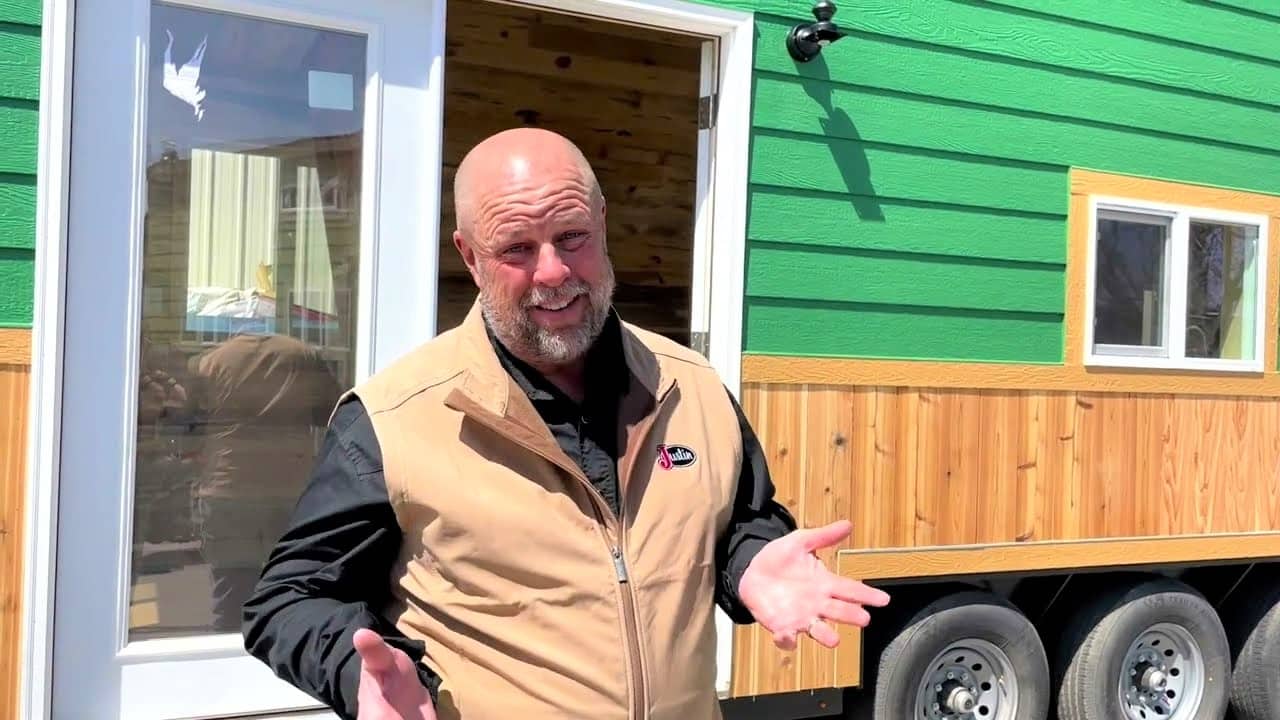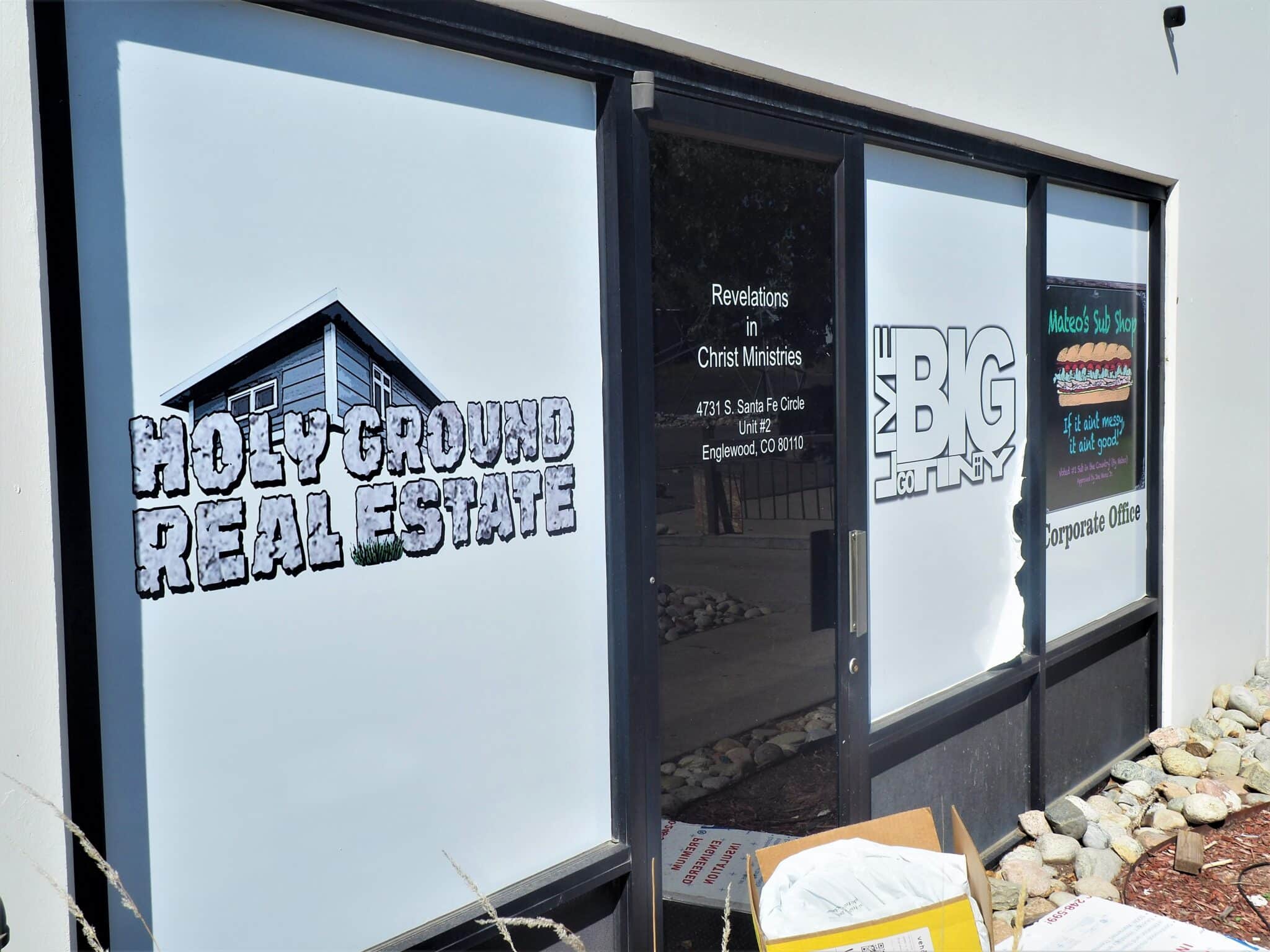
Matt Sowash, founder of Holy Ground Tiny Homes, stands outside a 32-foot home that it built. (Image courtesy of YouTube)
Holy Ground Tiny Homes, a struggling builder that has enraged customers with years-long wait times and lies, was evicted from one of its two warehouses in Englewood on Friday.
The nonprofit owed $31,270 in unpaid rent when it left its office at 4731 S. Santa Fe Circle, according to court documents. It was 19 months into a five-year lease.
A BusinessDen reporter visited the location Tuesday and found it empty inside, though signage on the windows still referred to it as the corporate office for Holy Ground.
Through its attorney, Holy Ground declined to comment on the eviction or answer questions about what it means for production of its tiny homes. The location was one of two where Holy Ground, which has a large backlog of orders, built houses.
On Aug. 29, BusinessDen first reported that Holy Ground, founded by convicted fraudster Matthew Sowash in 2019, had taken some customers’ life savings, kept them waiting years for homes that were promised to arrive in months, and refused refunds.
Two days later, Sowash sent a letter to past and present customers. In it, he apologized for long wait times but said his business model is working. He attached a copy of BusinessDen’s article, called it “damaging” and reprimanded customers for speaking to reporters.
“That’s why I have always stressed to not bring negativity towards what we are trying to do, because it will only hurt us, not help us,” Sowash wrote in the Aug. 31 letter.
As he did in an interview with BusinessDen for the article, Sowash in his letter touted plans for a village of tiny homes in far north Denver. He said it would raise more than $1.5 million in capital, allowing Holy Ground to ramp up production and reduce its multi-year wait times. But, he wrote, negative media attention “has really put a hurt on this project becoming reality.”
Within a few days, a YouTube video explaining his plans for the tiny home village at 5030 York St., an industrial property in the Elyria-Swansea neighborhood that Sowash does not own, was taken down and all mentions removed from Holy Ground’s website. Attempts to reach the property owner for comment were unsuccessful.
Vivi Gloriod, a local real estate agent, had hoped to help Sowash with the project but changed her mind as August turned to September.
“Everything kind of fell like a ton of bricks out of the sky when that article got printed,” she said by phone Sept. 6.

The former location of Holy Ground Tiny Homes at 4731 S. Santa Fe Circle in Englewood. (Justin Wingerter photo)
“I was super excited about doing the whole project, but I just don’t feel like I can. It’s too much risk. I’ve worked so hard to have a great reputation and to help people throughout the metro,” Gloriod said. “Even if what he’s saying is completely true and he’s mended everything and everything is right, I just can’t risk my reputation.”
Gloriod is a past customer of Holy Ground and a satisfied one; she said she received “a great” tiny home in a timely manner. She said she believes Sowash is trying to do the right thing and she still hopes to use tiny homes to alleviate the metro area’s scarcity of affordable housing.
“We were talking about all of the things that we wanted to do. We had lots of plans,” she said of herself and Sowash. “But once the article came out, I really couldn’t do anything.”
Other articles have followed, including from NBC News. Most center around two lawsuits — one in federal court, another in Arapahoe County — in which a total of three customers who haven’t received the homes they paid for are suing Holy Ground for monetary damages.
Sowash initially responded to the lawsuits by sending letters to the judge in each case, explaining Holy Ground’s hardships. He has since hired a lawyer, Brian DeBauche, who has formally responded to the lawsuits by acknowledging Holy Ground is “struggling.”
DeBauche has admitted the plaintiffs in both lawsuits paid for a house they have not received and, in the case of two customers, were denied refunds. But he denies his client has breached contracts with those customers and blames the long delays, in part, on “COVID-19 and the pandemic,” which he calls an unforeseeable “act of God.”
Holy Ground’s woes are concerning to Virginia Owen, a disabled 61-year-old Texan. She wired the inheritance she received from her parents, who died recently, to Holy Ground. In exchange for paying $50,000 up front, she was told the home would arrive in 10 weeks.
That was in May. By the end of July, there was no home, she was broke and she was being evicted. Donations from friends and family bought a stay in a cheap motel. Holy Ground has since told her to expect a home in April 2023 or, if she wants a refund, September 2023.
“The thought of not getting that money soon — I can’t even imagine,” Owen said through tears Friday. “I just got to stay positive and hope this will work out.”
Over the summer, as word of long delays at Holy Ground reached its customers, Owen left a tearful and begging message on the charity’s voicemail.
“Please,” the message said, “don’t do this to me.”

Matt Sowash, founder of Holy Ground Tiny Homes, stands outside a 32-foot home that it built. (Image courtesy of YouTube)
Holy Ground Tiny Homes, a struggling builder that has enraged customers with years-long wait times and lies, was evicted from one of its two warehouses in Englewood on Friday.
The nonprofit owed $31,270 in unpaid rent when it left its office at 4731 S. Santa Fe Circle, according to court documents. It was 19 months into a five-year lease.
A BusinessDen reporter visited the location Tuesday and found it empty inside, though signage on the windows still referred to it as the corporate office for Holy Ground.
Through its attorney, Holy Ground declined to comment on the eviction or answer questions about what it means for production of its tiny homes. The location was one of two where Holy Ground, which has a large backlog of orders, built houses.
On Aug. 29, BusinessDen first reported that Holy Ground, founded by convicted fraudster Matthew Sowash in 2019, had taken some customers’ life savings, kept them waiting years for homes that were promised to arrive in months, and refused refunds.
Two days later, Sowash sent a letter to past and present customers. In it, he apologized for long wait times but said his business model is working. He attached a copy of BusinessDen’s article, called it “damaging” and reprimanded customers for speaking to reporters.
“That’s why I have always stressed to not bring negativity towards what we are trying to do, because it will only hurt us, not help us,” Sowash wrote in the Aug. 31 letter.
As he did in an interview with BusinessDen for the article, Sowash in his letter touted plans for a village of tiny homes in far north Denver. He said it would raise more than $1.5 million in capital, allowing Holy Ground to ramp up production and reduce its multi-year wait times. But, he wrote, negative media attention “has really put a hurt on this project becoming reality.”
Within a few days, a YouTube video explaining his plans for the tiny home village at 5030 York St., an industrial property in the Elyria-Swansea neighborhood that Sowash does not own, was taken down and all mentions removed from Holy Ground’s website. Attempts to reach the property owner for comment were unsuccessful.
Vivi Gloriod, a local real estate agent, had hoped to help Sowash with the project but changed her mind as August turned to September.
“Everything kind of fell like a ton of bricks out of the sky when that article got printed,” she said by phone Sept. 6.

The former location of Holy Ground Tiny Homes at 4731 S. Santa Fe Circle in Englewood. (Justin Wingerter photo)
“I was super excited about doing the whole project, but I just don’t feel like I can. It’s too much risk. I’ve worked so hard to have a great reputation and to help people throughout the metro,” Gloriod said. “Even if what he’s saying is completely true and he’s mended everything and everything is right, I just can’t risk my reputation.”
Gloriod is a past customer of Holy Ground and a satisfied one; she said she received “a great” tiny home in a timely manner. She said she believes Sowash is trying to do the right thing and she still hopes to use tiny homes to alleviate the metro area’s scarcity of affordable housing.
“We were talking about all of the things that we wanted to do. We had lots of plans,” she said of herself and Sowash. “But once the article came out, I really couldn’t do anything.”
Other articles have followed, including from NBC News. Most center around two lawsuits — one in federal court, another in Arapahoe County — in which a total of three customers who haven’t received the homes they paid for are suing Holy Ground for monetary damages.
Sowash initially responded to the lawsuits by sending letters to the judge in each case, explaining Holy Ground’s hardships. He has since hired a lawyer, Brian DeBauche, who has formally responded to the lawsuits by acknowledging Holy Ground is “struggling.”
DeBauche has admitted the plaintiffs in both lawsuits paid for a house they have not received and, in the case of two customers, were denied refunds. But he denies his client has breached contracts with those customers and blames the long delays, in part, on “COVID-19 and the pandemic,” which he calls an unforeseeable “act of God.”
Holy Ground’s woes are concerning to Virginia Owen, a disabled 61-year-old Texan. She wired the inheritance she received from her parents, who died recently, to Holy Ground. In exchange for paying $50,000 up front, she was told the home would arrive in 10 weeks.
That was in May. By the end of July, there was no home, she was broke and she was being evicted. Donations from friends and family bought a stay in a cheap motel. Holy Ground has since told her to expect a home in April 2023 or, if she wants a refund, September 2023.
“The thought of not getting that money soon — I can’t even imagine,” Owen said through tears Friday. “I just got to stay positive and hope this will work out.”
Over the summer, as word of long delays at Holy Ground reached its customers, Owen left a tearful and begging message on the charity’s voicemail.
“Please,” the message said, “don’t do this to me.”
